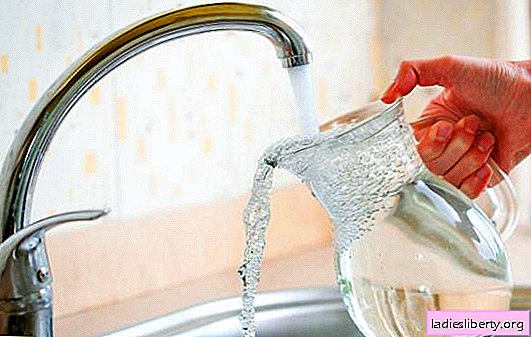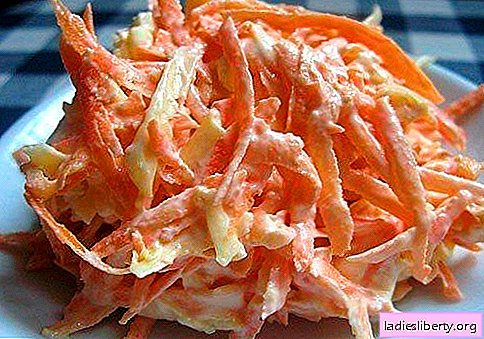
Hard water can clog your kettle, but there is strong evidence that it helps protect your heart. Certain impurities in water can be very beneficial for your body's health and immunity.
What is called hard water?
Hard water is simply water that contains a large amount of minerals. These minerals are mainly magnesium carbonate, calcium and manganese. However, stiffness can be caused by several other dissolved metals; these forms are divalent or multivalent cations, including aluminum, barium, strontium, iron, zinc and manganese. Usually monovalent ions, such as sodium and potassium, do not cause hardness. But divalent cations tend to combine with anions in water and form stable salts. The type of anion found in these salts distinguishes between two types: carbonate and non-carbonate hardness.
Carbonate hardness is due to metals combined with alkalinity. Alkalinity - the ability of water to neutralize acids, is attributed to compounds such as carbonate, bicarbonate, hydroxide, and sometimes borate, silicate and phosphate. In contrast, non-carbonate stiffness is formed when metals combine with anything.
Carbonate hardness is called temporary because it can be removed by boiling. Non-carbonate stiffness cannot be removed by boiling, therefore it is also known as constant stiffness.
The most obvious evidence of the presence of hard water in the tap is that soap and shampoo are poorly washed, bathtubs, washbasins and shiny plumbing parts are plaque, laundry is dirty and deposits accumulate in the kettle.
The minerals that are most commonly found in water are calcium, magnesium, and manganese carbonates. These minerals naturally end up in the water as water seeps through minerals containing calcium or magnesium. The most common sources are limestone (which introduces calcium into water) and dolomite (which introduces magnesium). They are usually beneficial to the human body. Groundwater often has greater hardness than surface water.
A classic measure of the concentration of calcium and magnesium cations in water is mol / m3; in practice, degrees of hardness and milligram equivalents per liter (mEq / l) are usually used. Starting January 1, 2014, a standard was introduced in Russia, according to which stiffness is expressed in degrees of hardness (° W), 1 ° W = ½ mmol / l = 1 mEq / l.
Distinguish soft water (10 ° W).
What are the benefits of drinking hard water?
Hard Water Benefits
Calcium intake
Calcium is essential for your health. One of the most important properties of this mineral is bone strengthening; its amount contained in the body determines the strength of the skeleton.
Calcium and Vitamin D are recommended if you or your family members, including children, want healthy, strong bones. Since calcium is one of the main ions in hard water, its use helps to add the necessary amount of minerals to the body.
An adult who is deprived of calcium in his body experiences great difficulties, especially when performing complex tasks that require additional effort. This is because he has weak bones (hypocalcemia). The latter leads to dire consequences, including fractures.
Hard water makes a significant contribution to the overall supply of calcium to the body.
Also, studies conducted by WHO have shown that calcium tends to lower the risk of colon cancer. Although too high amounts of calcium can lead to prostate cancer, the level of calcium in hard water is much lower, therefore, it is sufficient to prevent diseases, and not their occurrence.
Another advantage of calcium in water is a reduced risk of cardiovascular disease. However, studies are still underway to determine the amount of calcium suitable for the prevention of CVD diseases.
Magnesium intake
Drinking magnesium through water can also be a preventative measure for some diseases. Magnesium regulates about 350 cellular enzymes in the body. These enzymes control important functions such as regulation of blood pressure, stabilization of heart rhythms and muscle contraction. Magnesium intake lowers arterial hypertension (high blood pressure), the risk of diabetes and improves heart health.
According to a WHO study in 2009: "Low levels of magnesium have been linked to hypertension, coronary heart disease, diabetes mellitus and metabolic syndrome."
In one meta-analysis, researchers concluded that 100 mg magnesium supplementation was associated with an 8% reduction in the risk of stroke, especially ischemic strokes.
In general, future research in this area will give us a better understanding of the importance of magnesium in protecting our hearts.
Both calcium and magnesium are essential for the human body. In addition, hard water leads to less pipe corrosion, provided that it is not too hard. Soft water is more likely to begin to dissolve the metal walls of the pipes through which it flows.
Disadvantages of hard water
Hard water does not have an adverse effect on the health of the body. However, everyday use of hard water can cause troubles in everyday life, during washing and cooking.
Some of the problems associated with hard water are:
• Blockage of pipes;
• Increased consumption of soap and detergents;
• A slight increase in the wear of household appliances and plumbing (this is especially true for fittings in toilet bowls);
• Stains on shiny surfaces and glass.
With clogged pipes your equipment will work less efficiently. This often leads to higher electricity bills and even to damaged devices. Blockages can lead to pipe leaks and shorten the life of your equipment. In addition, permanent stains on sinks, showers, bathtubs, glass and even furniture are possible.
Also, one of the most noticeable effects of hard water is skin irritation and dryness. Eczema in children just related to this factor.
Hard water is very beneficial for the human body. Its positive impact cannot be ignored, and it completely covers the problems associated with it. Drinking soft water robs you of valuable minerals that you can easily get from drinking hard water. These minerals will help increase your overall health and reduce the risk of certain diseases.
Those who think that hard water is annoying when it comes to household chores may have devices to soften water for such purposes as washing, washing dishes, making tea, watering plants, etc. At the same time, you can have hard water for drinking at home. This will help you get the benefits of drinking hard water and avoid negativity.











